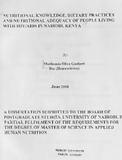Nutritional knowledge, dietary practices and nutritional adequacy of people living with hiv/aids in Nairobi, Kenya
Abstract
HIV infection reduces the intake, absorption, and utilization of nutrients especially
micronutrients, The cycle between malnutrition and HIV/AIDS is vicious. In addition HIV
infected persons have increased macronutrient requirements and are commonly deficient in
almost all key micronutrients including vitamin A, B-complex, C, E, zinc, magnesium, iron
and selenium. These can only be achieved if they have adequate and appropriate nutritional
information, coupled with sound dietary practices. The objective of the study therefore was
to determine nutritional knowledge, dietary practices and nutritional adequacy of proteins,
calories, iron, vitamin A and C among people living with HIV and_AIDS.
A cross-sectional study of both descriptive and analytic design involving purposively
sampled 153 persons living with HIV/AIDS from Women Fighting Aids in Kenya and the
staff members of the organization was conducted in July and august 2005. Data collection
tools included a pre-tested semi-structured questionnaire that included a food frequency
questionnaire, 24-hour recall questionnaire, key informant and focus group discussion
guides. Data were collected on demographic and socioeconomic status, respondents'
dietary practices and intake and nutritional knowledge including its sources. Two wellqualified
and trained field enumerators assisted in data collection.
The data were analyzed using SPSS software package. The P-value for statistical
significance test was set at <0.05. Results showed that the average meal frequency was
three times per day (inclusive of snacks), which was below the recommended 5-6 times per
day. Calorie and vitamin A intake of 96.9% and 87.5% respondents was below the
Recommended Daily Allowances. 96.9% and 68.8% of the respondents respectively had
vitamin C and protein levels above the Recommended Daily Allowances. The study
population had adequate intake of iron. Most respondents (71.9%) had an average dietary
diversity scores. There was a strong association between dietary diversity and dietary
adequacy.
Nutritional knowledge among the respondents was inadequate because majority (61%) had
average nutrition knowledge and none was ranked in the highest level. The quality of
nutrition information sources was questionable. Only 13% of the respondents were on
nutrition supplements at the time of study. Multiple micronutrient supplementations for
PLWHA should be greater than one RDA per day from the time they are diagnosed. Access
to the supplements was limited. Nutrient adequacy significantly increased with dietary
diversity at P<O.05 and the two were positively and strongly associated with per capita
income spent on food.
Factors contributing to dietary adequacy included per capita income spent on food per day,
dietary diversity, number of meals consumed in a day and size of the household all which
had significant and positive association with the adequacy of nutrients.
Thus nutrition being the core of good health for PLWHA, the government should set up
strategies to ensure that well trained nutrition educationist are deployed at the community
levels. Nutrient supplements should also be accessible so as to compliment the food
consumed and thus ensuring adequacy. Further, the government and NGOs should support
households affected and infected by HIV/AIDS to become economically stable and
nutritionally secure.
Citation
Master of Science in Applied Human NutritionPublisher
University of Nairobi Department of Food and Nutrition Technology

